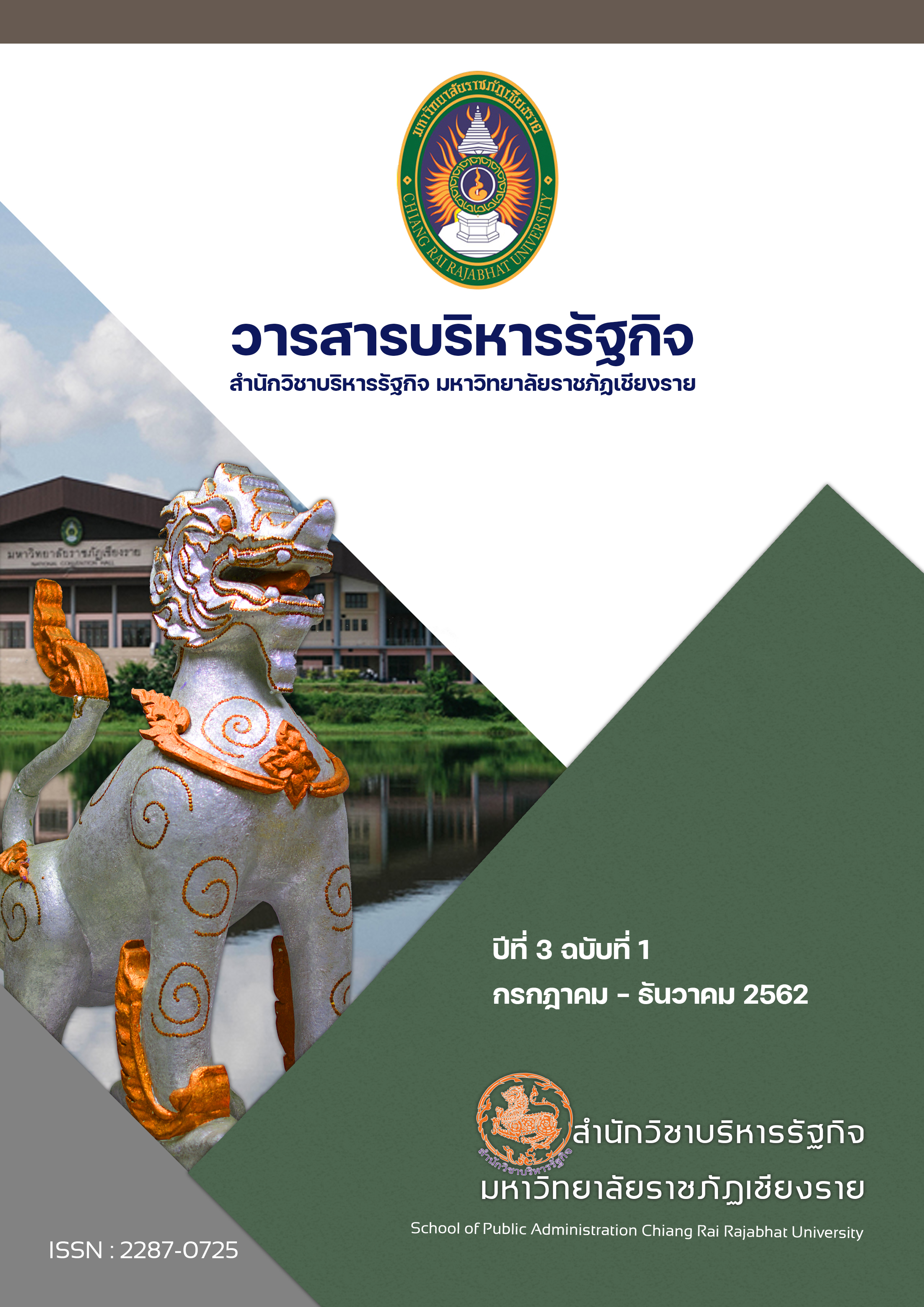Populist Project: Populism Policies under [Thailand’s] New Constitution and the Inheritance of the National Council for Peace and Order (NCPO)
Main Article Content
Abstract
“Populist Project” was the policy implementation of the National Council for Peaceand Order (NCPO) that had proceeded from 2014 to 2017 and was then monitored in a way that the NCPO regime made the transfer of power [from a military to a civiliangovernment] under the party’s name, Palang Pracharath as a proxy party, through the 2019electoral process. Palang Pracharath Party (PPRP) was a core party to form a governmentand transformed the NCPO implemented policies into line with successful implementationof ‘populist policies’ in the past period. The transformation [of ‘populist policies’ into‘Populist Project] entailed gaining in its political popularity and meeting the basic needsof the general populace continually. Although the middle-classed people or investorscensured the ‘Civil State Policy’ on the loss of economic efficiency, the government’spolicy manifesto had yet to be rooted out of populism policies. The reasonable cause wasto satisfy the vast majority of political bastion in civil society, viz, ‘grass-roots groups’.Consequently, the new government formed by the transfer of NCPO political power to the 2019 electoral process is obligated to implement its ‘civil state policy’ with moreemphasis on crucial political support bases and political popularities in order to win the election than the proposed party policies by PPRP. In its election manifesto, the PPRP hadindeed proposed creating the sustainable economic systems in relation to ‘welfare state’with a focus on the efficiency of collecting taxes and providing taxpayers with socialwelfare benefits.
This article aims to study the meanings of populism, the operational guidelines for government policy implementation in Thailand, the integration of civil state programsconsistent with the national strategic plans enshrined in the new constitution, and the problems of inequalities in Thai society under [neo] populism. The study showed that the operational guidelines of ‘populism in the previous periods’ adopted by prior governmentswere transformed and tailored to the party platform of ‘civil state (Pracharath) programs’ designed and implemented by NCPO and the transfer of NCPO political power to ‘PalangPracharath Party’ after the 2019 election. They could be analysed and summarized intofive major aspects with regard to the [successful] policy implementation of populist policiesvia civil state policies, namely: 1) empowering policy legitimacies and political popularities;2) incorporating legal mechanisms designed to enable the National Council for Peace andOrder (NCPO) to transfer its power into the 2017 Constitution consistent with the 20-yearnational strategic plans; 3) undertaking the NCPO implemented policies ; 4) demonstratingthe model of policy-oriented identities, and 5) identifying political policies in accordancewith a context of political competition.
Article Details
References
Chaisaard, W. (2017). The Impact of Vending Machine on the bus to Thai people. Retrieved June 26, 2019 from https://www.posttoday.com/politic/report/530566
Chantorapidok, A. (2019). The Illusion of the Finance:The Analysis of the Effect of thePopularism Policy implementation. Silpakorn University Journal, 39(1), 1-17.
Chutipat, W. (2011). Greece, The Priority for Victory is first without uninterested ofthe damaged country. Retrieved July 8, 2019 from http://www.doctorwe.com/posttoday/20110707
Insrisawang, C. (2016). The Government’s New Year Gift which staking for rising Thailand’s economy. Retrieved June 26, 2019 from https://www.posttoday.com/politic/report/470837
Itsarachai, Y. (2018). The Wealthy Government give bonus to the poor and cause tochaotic. Retrieved June 26, 2019 from https://mgronline.com/live/detail/9610000122634 26/6/62
Jitsuchon, S. (2014). The Inequality in Thailand Society: The Policy Trends and the Path to use the Policy. Retrieved July 26, 2019 from https://tdri.or.th/wp-content/uploads/2017/06/Synthesis-Report-Year-2-Inclusive-Growth.pdf
Kachanan, R. (2015). The Analyzing of the different from the Civil State and the Popularism. Retrieved June 26, 2019 from http://dl.parliament.go.th/bitstream/handle/lirt/520919/hi2558-098.pdf?sequence=1
Ktcore. (2018). “Card for Poor” The Policy of Civil Welfare 4.0 Success or Fail ?. Retrieved June 25, 2019 from https://www.ktcore.com/2018/602/
Laothammatad, A. (2006). Taksina-Popularism. Bangkok: Matichon Publishing House.
Lingle, C. (2002). The Perils of Populism. [Online]. Retrieved June 15, 2017 from https://admin.fee.org/files/doclib/lingle0502.pdf
Office of the National Economic and Social Development Council. (2017). (Draft) National Strategy in 20 Years Term (2017-2036). Retrieved July 21, 2019 fromhttps://www.nesdb.go.th/download/document/ร่างยุทธศาสตร์ชาติ%20ระยะ%2020%20ปี%20(พ.ศ2560%20-%202579).pdf
_______. (2017). National Strategy in 20 Years Term 2018-2037 (Brief). Retrieved July 21,2019 from https://www.nesdb.go.th/download/document/SAC/NS_SumPlanOct2018.pdf
Palang Pracharath Party. (2019). Civil welfare. Retrieved July 21, 2019 from https://pprp.or.th/สวัสดิการประชารัฐ/_______. (2019). Civil Society. Retrieved July 21, 2019 from https://pprp.or.th/สังคมประชารัฐ/
_______. (2019). Civil State Economy. Retrieved July 21, 2019 from https://pprp.or.th/เศรษฐกิจประชารัฐ/Parliament. (2017). The Constitution of the Kingdom of Thailand 2017. Bangkok:Parliament.
Piphatsereetham, N. (2012). The Factor that Cause Populism in Thailand Democracy. Thammasat Economic Journal, 26(3).
_______. (2017). The Constitution of the Kingdom of Thailand 2017. Retrieved July 28,2019 from http://www.ratchakitcha.soc.go.th/DATA/PDF/2560/A/040/1.PDF
Promphap, S. & Wongsurarat, K. (2015). Popularism of Thailand Democracy D.C. 2010 - 2014. Journal of Political Science and Law Kalasin Rajabhat University, 4(2), 232-249.
Saengsuwan, A. (2010). The Inequality. Bangkok: Sasin Graduate Institute of Business ofAdministration of Chulalongkorn University. Retrieved July 14, 2019 from https://library2.parliament.go.th/ebook/content-issue/2558/hi2558-052.pdf
Sangkaew, T. & Pankaew, A. (2016). Roadmap of Democracy. Retrieved June 26, 2019from wiki.kpi.ac.th/index.php?title=Road_Map_ประชาธิปไตย
Storylog. (2016). The lesson from Argentina. Retrieved June 25, 2019 from https://storylog.co/story/5731de4927d3f4562310cdf3 3/7/62
Tansakul, S. & Team. (n.d). Thailand Future Foundation: The Study’s Series of the 8 Facts from the Inequality in Thailand Society. Retrieved July 26, 2019 fromhttps://thaipublica.org/wp-content/uploads/2014/04/8-ข้อเท็จจริงความเหลื่อมล้ำในไทย_full_report.pdf
Thamjai, A. (2018). Civil State, Popularism, and Welfare State. Retrieved July 13, 2019 from https://www.bangkokbiznews.com/blog/detail/635795
Voicetv. (2019). 14.5 Million of the Civil Welfare Cardholder had spend around3,800 million BAHT in January. Retrieved June 25, 2019 from https://voicetv.co.th/read/xSgkOLbs2
Waitayangkoon, C. (2017). Inequality in Society from Government Policy (End). Retrieved July 14, 2019 from https://www.bangkokbiznews.com/blog/detail/641826
Wangkittikul, P. (2011). The Impact of Taksin’s Populism Policy to Politic of Thailand Democracy. Master’s Thesis, Bangkok: Chulalongkorn University. Retrieved July21, 2019 from http://cuir.car.chula.ac.th/dspace/bitstream/123456789/60016/1/5781044024.pdf
Wongkrasan, N. (2011). Greece. The Study Case of Debt Crisis and Populism which Impactto Human ecology. Retrieved July 8, 2019 from http://popularity49.blogspot.com/2011/12/blog-post_22.html
Workpoint News. (2018). Repeating, the right to use free electronicity of Civil Welfare Card must use less than 230 BAHT. Retrieved July 20, 2019 from https://workpointnews.com/2018/12/14/ย้ำสิทธิ์ค่าไฟฟรี-บัตร/


